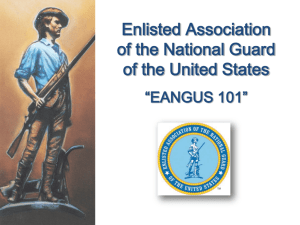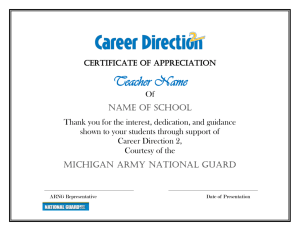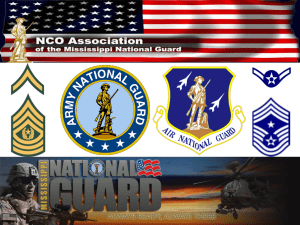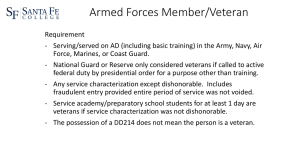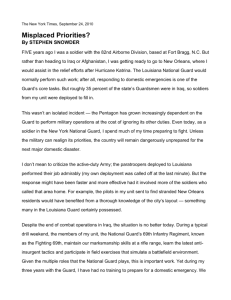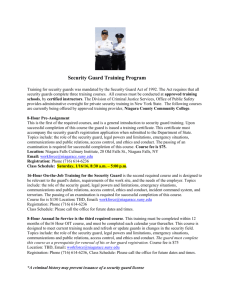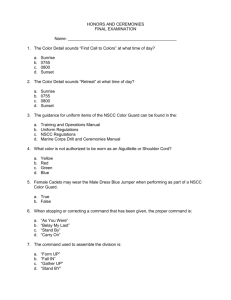EANGUS Draft Resolutions 2006
advertisement
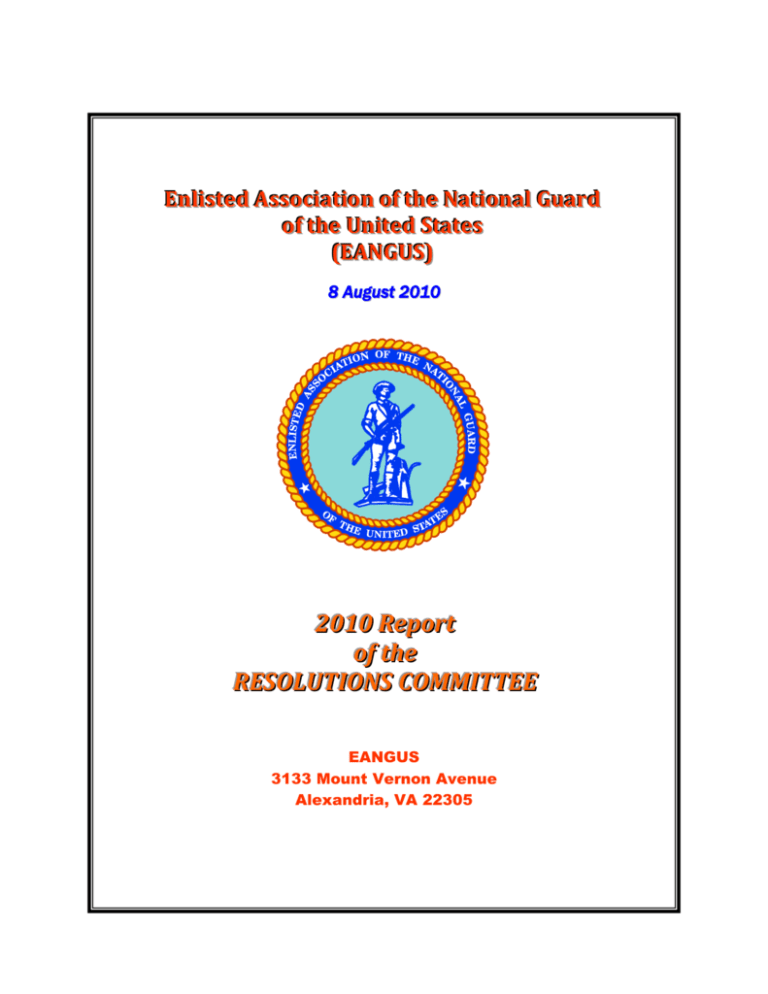
EEnnlliisstteedd A Assssoocciiaattiioonn ooff tthhee N Naattiioonnaall G Guuaarrdd ooff tthhee U Unniitteedd SSttaatteess ((EEA AN NG GU USS)) 8 August 2010 2010 Report of the RESOLUTIONS COMMITTEE EANGUS 3133 Mount Vernon Avenue Alexandria, VA 22305 2010 EANGUS Resolutions Index 10-01 Pertaining to Homeowners Assistance Program 10-02 Pertaining to Retiree Service Office and Retiree Programs for the Reserve Component 10-03 Pertaining to Reserve Component Burial Benefits 10-04 Pertaining to Funding of the Strong Bonds Program 10-05 Pertaining to the Definition of “Veteran” to Include all National Guardsmen with 20 Years or More of Service and All Dual Status Military Technicians Serving During Defined Times of War 10-06 Pertaining to Establishment of a National Guard Emergency Relief Fund 10-07 Pertaining to Air National Guard Enlisted Grades Review 10-08 Pertaining to Support of the Structure and Equipment Issues Endorsed by the National Guard Association of the United States (NGAUS) and the Adjutants General Association of the United States (AGAUS) that Contribute to the Accomplishment of the Purposes and Goals of the Enlisted Association of the National Guard of the United States (EANGUS) 10-09 Pertaining to Funding of Federal Assistance program for the Air National Guard. 10-10 Pertaining to VA Home loan Eligibility for Title 32 AGR Soldiers and Airman. 10-11 Recognition of Michael Cline as Executive Director of the Enlisted Association of the National Guard of the US. 10-12 Pertaining to Appreciation for the Hospitality and Efforts by the State of Missouri, the City of St. Louis and the Missouri National Guard Enlisted Association and Auxiliary. 2 THIS PAGE INTENTIONALLY LEFT BLANK THIS PAGE INTENTIONALLY LEFT BLANK ______________________________________ 3 EANGUS RESOLUTION 10-01 PERTAINING TO: Homeowners Assistance Program ISSUE: Homeowners Assistance Program Inequity BACKGROUND: Since 1966 the Homeowners Assistance Program has assisted service member and civilian employee homeowners when their home values declined because base closure or realignment announcements caused decline in real estate markets." The President recently signed the American Recovery and Reinvestment Act of 2009 which contains funding of $555 million, and authorizes expansion of HAP to three homeowner groups: BRAC05 for service members and civilian employees – temporary program expansion removes requirement for proof of the causal relationship between the BRAC announcement and the real estate market decline. Expanded BRAC HAP benefits have a sunset clause of 2012, or earlier if designated by the Secretary. Warriors in Transition for (30% or greater DoD disability rating) and surviving spouses of fallen warriors. This is a permanent program expansion. Service members under a military-directed permanent change of station during the downturn of the housing market. Expanded PCS HAP benefits have a sunset clause of 2012, or earlier if designated by the Secretary. The HAP was initiated by the Demonstration Cities and Metropolitan Development Act of 1966 (as amended) to provide partial financial relief to service member and civilian employee homeowners whose homes decline in value when a base closure or realignment causes a market decline, and homeowners are unable to sell under reasonable terms or conditions. The law required proof that a market decline was caused by a DOD announcement of closure or realignment. The HAP is a Defense program; the Secretary of the Army is the program executive agent, and the U.S. Army Corps of Engineers executes the program. Currently this program only applies to Title 10 Active Duty Service Member. When the original program was developed Title 32 Active Duty Service Members didn’t exist. The AGR Program came about in the early 1980’s and their exclusion is believed to be an oversight of the Joint Force of Active Duty, National Guard and Reserve. RECOMMENDATION: That the Enlisted Association of the United States urge the United States Congress to expand the current Homeowners Assistance Program to include Service Members in a Title 32 Active Duty Status retroactive to the date of the latest expansion. SPONSOR: Indiana 4 EANGUS RESOLUTION 10-02 PERTAINING TO: Retiree Service Office and Retiree Programs for the RC BACKGROUND: There is a lack of dedicated support and programs focused on our traditional (m-day) National Guard retirees and all Reserve Component retirees. This includes both the “gray area” retiree (prior to attaining age 60), as well as the retiree who is over age 60 and drawing retired pay. Many of these retirees, particularly the gray area retirees do not fully understand their Reserve retirement benefits and consequently, are not processed for retired pay in a timely manner, or lose out on other benefits they are entitled to. Although some States have found other means or resources to implement their own program or use retiree volunteers to staff a retiree services office, there are far too many States that do not have a specific retiree program or have programs lacking in many areas. There is no standardized or complete out-processing program for an Mday retiree. Only a few states have a specific program to train and educate these retirees and their spouses in their benefits and how to apply for them. In many cases, the job of providing assistance to retirees is an additional duty shared by several staff members or offices within the G1/J1. Additionally, there is no concerted effort to remain in contact or keep these NG Retirees informed of changes in benefits that might occur between their retirement date and when they start drawing retired pay (in some cases, 10-20 years later). Although there are Retirement Services Offices on major military installations, their focus is on the Active Duty retiree and they do not, as a rule, provide support to the hundreds of thousands of traditional Guard/ Reserve retirees that live in our communities. RSOs at active duty installations are not staffed, and do not understand the Reserve retirement system, and are too far away from our retirees to provide a sufficient level of care and support. A dedicated full-time Retirement Service Coordinator is needed at each State Headquarters to consolidate efforts and provide the needed support. The joint nature of the State Headquarters makes this the appropriate location for such a position. This position would be responsible for all RC retiree-related issues and would consolidate actions under one position/office. Their duties would include, but not be limited to: development and execution of an outprocessing program as well as a program for informational briefings on benefits and entitlements before retirement, maintenance of a specific State retiree web-page, and management of retiree recognition and volunteer programs. Additionally, each State should hold an annual RC Retiree Appreciation Day, and Adjutants General and local RC commanders should establish an RC Advisory Council, much like Active Duty installations have to provide a channel of communication for local retiree issues and concerns. Establishment of a dedicated retiree services office at each State HQ has been recognized as needed and is supported by the Army’s Retiree Council. RECOMMENDATION: That EANGUS urges the Department of Defense and National Guard Bureau to provide full-time support and funding to develop programs that focus specifically on the m-day retiree. It is requested that a Retiree Services Coordinator position be created at the NG Headquarters in each State to coordinate this program. SPONSOR: ARIZONA 5 EANGUS RESOLUTION 10-03 PERTAINING TO: Reserve Component Burial Benefits BACKGROUND: Burial benefits are currently authorized under Title 10 USC, with Public Law 109-80 and 109-163 making death gratuity benefits permanent for nearly all active duty deaths. However, this authority limits the payment of death gratuity (currently $100,000) to the survivors of military members who die while in an active military status. The death gratuity payment is intended to be paid within 72 hrs after death to assist survivors in their readjustment and aid them in meeting immediate burial expenses. Additionally, members who die while on active duty, are generally entitled to $7,700 towards a cemetery plot/burial, and the mandatory assignment of a Casualty Assistance Officer (CAO). The services have also established Survivor Outreach Programs which assist survivors by assessing their needs, recommending solutions, and ensuring surviving families feel they belong to the Military Family for as long as they desire. These programs also ensure they have access to all of their entitlements and benefits. However, this same level of compassion, assistance, and support is lacking for surviving family members of our Reserve Component. These military burial benefits specifically exclude any member of the Reserve Component who dies while not in an active military status, despite the fact that they are “members” of the military 24/7 and continue to serve our Nation honorably and faithfully. Most of these RC members have deployed one or more times, they have performed duties in both a state and federal status, they often go on and off an active military status one or more times a month, and they remain in the Reserve Components ready and willing to serve their State and Nation again at a moment’s notice. Even those members serving in military uniform on a State Active Duty status are entitled to no military burial benefits if they were to die, or be killed in the performance of that particular duty. Currently, family members who lose a loved one serving in the Reserve Component not on active duty status, receive only the SGLI payment if eligible; however, SGLI is often not paid until completion of a lengthy process, during an extremely trying and stressful time. They receive no death gratuity payment to assist with immediate funeral expenses, and are not entitled to a CAO. Despite the lack of approval or support from the Casualty Assistance Command (CAC), some States do provide a CAO to the Army/Air National Guard members’ survivors on their own, because it’s the right thing to do. Our Soldiers and Airmen deserve that benefit, as a minimum. Additionally, with the continuing high level of service and support provided by our Reserve Component members, it is also recommended that a partial RC death gratuity payment be approved, with the amount to be at least equal to the pre-2001 level of death gratuity payment which was $12,000. This partial death gratuity payment would go a long way towards showing the survivors of Reserve Component members that they too are part of the Military Family. RECOMMENDATION: That EANGUS urges the Congress of the United States to enact legislation that would provide burial benefits to include a partial death gratuity payment of $12,000.00, and mandatory appointment of a CAO for RC members who die, regardless of duty status. SPONSOR: Arizona 6 EANGUS RESOLUTION 10-04 PERTAINING TO: Funding the Strong Bonds Program ISSUE: Funding for the Strong Bonds Program has been cut to the point where some iterations of the program have been cancelled causing a waiting list of Guardsmen and spouses who wish to participate. BACKGROUND: Strong Bonds, begun in 1999, is a unit-based, chaplain-led program which assists commanders in building individual resiliency by strengthening the Military Families. The core mission of the Strong Bonds program is to increase individual Service members and Family member readiness through relationship education and skills training. Strong Bonds includes four subprograms applied across the Army Force Generation model: single-Soldier, couple, Family, and deployment. Strong Bonds is conducted in an offsite retreat format in order to maximize the training effect. The retreat or "get away" provides a fun, safe, and secure environment in which to address the impact of relocations, deployments, and military lifestyle stressors. In 2004, the U.S. Code was amended to allow support for "chaplain-led programs to assist members of the armed forces ...in building and maintaining a strong Family structure." During Fiscal Year 2009, more than 160,000 Soldiers and Family members participated in over 2,600 Strong Bonds events. The Army will continue to provide relationship training tools, and make them available to more Soldiers and Family members. Fiscal Year 2010 is the third year of a five-year longitudinal study evaluating the effectiveness of the Strong Bonds program. Also, commanders from the Active Army, the National Guard, and the Army Reserve plan more than 4,000 Strong Bonds events in 2010 to include Service members geographically dispersed from military installations. To accomplish this, commanders across the total Army have requested more than $103 million in support of Strong Bonds. Healthy relationships contribute to the maintenance of a healthy Military and a secure future force. With increasing demands placed on Service members and Families, to include both frequent deployments and duty relocations, intimate relationships are fully tested. Research shows that training in communication skills, intimacy, and conflict management increases marital satisfaction and reduces rates of family violence. Building Military Family resiliency is part of a strategic approach to cope with the high operational demand placed on today's Military. RECOMMENDATION: The Enlisted Association of the National Guard of the US urge DoD and NGB to fully fund this program that is important to the well-being of our Service members and their families. SPONSOR: Connecticut 7 EANGUS RESOLUTION 10-05 PERTAINING TO: The Definition of “Veteran” to Include All National Guardsmen with 20 Years or More of Service And All Dual Status Military Technicians Serving During Defined Times of War ISSUE: Recognizing the Service of Dual Status Military Technicians during time of war BACKGROUND: Today’s National Guardsmen are called to action more than ever before and have become an operational force since Sept. 11, 2001, responding to the war effort and natural disasters such as hurricanes, tornadoes and wildfires. Today’s Guardsmen are deployed in nearly every part of the world in war fighting and peacekeeping missions. Yet there are those who, for various reasons, may never deploy, but still maintain their physical and mental fitness for potential deployments, and who work on a daily basis to support the war effort. Many traditional Guardsmen who don’t deploy, will put in 20, 30, 40 or more years in the service of their state and nation and yet are not entitled to some of the same benefits that other soldiers, airmen, sailors and Marines receive after only serving, in some cases, two years. Dual status military technicians are also required to maintain their physical and mental fitness while working side-by-side with their Active Guard Reserve (AGR) counterparts supporting the soldiers and airmen of the National Guard and the warfighting effort. Many times these 20-year or more Guardsmen and the dual status military technicians are not eligible for federal or state benefits because they do not fall into the definition of “Veteran.” The federal definition of veteran includes members of the United States Army, Navy, Marine Corps, Coast Guard and Air Force, the commissioned officers of the Public Health Service, Environmental Sciences Services Administration or National Oceanic and Atmospheric Administration, including its predecessor the Coast and Geodetic Survey or the crew of a merchant vessel during the Second World War and qualified with respect to such service as members of the group known as the “American Merchant Marine in ocean-going service during the period of armed conflict, December 7, 1941 to August 15, 1945,” who served on active duty during a time of war. Many unarmed, uniformed services as noted above, receive benefits as “Veterans” of the Armed Forces, while traditional National Guardsmen with more than 20 years of service and dual status military technicians do not. RECOMMENDATION: The Enlisted Association of the National Guard of the United States recommends that NGB, DoD, the VA and Congress change the definition of “Veteran” to include all National Guardsmen with 20 years or more of service and all Dual Status Military Technicians who serve during a defined period of war. SPONSOR: Connecticut 8 EANGUS RESOLUTION 10-06 PERTAINING TO: Establishment of a National Guard Emergency Relief Fund ISSUE: Title 32 AGR Soldiers have been turned down for assistance through Army Emergency Relief. A National Guard Fund needs to be established to help our Soldiers and Airmen who fall on hard times due to deployments or the tough financial times currently being faced by so many in the United States. BACKGROUND: Army Emergency Relief (AER) is a private nonprofit organization incorporated in 1942 by the Secretary of War and the Army Chief of Staff. AER's sole mission is to help Soldiers and their dependents. AER is the Army's own emergency financial assistance organization and is dedicated to "Helping the Army Take Care of Its Own". AER provides commanders a valuable asset in accomplishing their basic command responsibility for the morale and welfare of Soldiers. AER funds are made available to commanders having AER Sections to provide emergency financial assistance to Soldiers - active & retired - and their dependents when there is a valid need. AER funds made available to commanders are not limited and are constrained only by the requirement of valid need. For these reasons, the AER assistance program is conducted within the Army structure by major commanders and their installation/organization commanders through AER sections and other related organizations. Title 32 AGR Soldiers have been turned as not being eligible for the assistance. RECOMMENDATION: The Enlisted Association of the National Guard of the US urge Congress, DoD and NGB to establish a National Guard Emergency Relief Fund. SPONSOR: Connecticut 9 EANGUS RESOLUTION 10-07 PERTAINING TO: Air National Guard Enlisted Grades Review ISSUE: The Enlisted Grades Review Council needs to re-write ANGI 38-202 to reflect present manpower end strength and approach each AFSC in an equitable manner. The present Grades Review Document does not balance comparable career fields in rank structure and affect recruiting and retention. BACKGROUND: The present ANGI 38-202 does not represent the enlisted force structure in current rank assignments. The perception of “rank” not being an “incentive” is false. Upward movement in rank is not the same as our active duty counterparts as it changes from State to State. Airman have made it known they will not continue with the part time career that is stifled. The Ops Tempo already puts a tremendous burden on family and civilian let alone not taking away the very basis of why they stay in past 6 years, which is promotion opportunity. These are the same professionals who save our military countless dollars with the experience and dedication they bring from their higher paying civilian jobs. The costs savings alone for the training of new individuals will more than pay for the difference in rank the NGB is looking at as a method to “comply” to an ANGI that does not fit our citizen / airman. The end result of such a move will greatly affect our mission capability during a time when present war doctrine has no end in sight. ANG Commanding Councils were not informed nor asked for knowledgeable input on how this move would affect mission readiness prior to the assembly of the “Grades Review”. RECOMMENDATION: The Enlisted Association of the National Guard of the United States recommends that the current enlisted grade realignment be readdressed allowing the expertise from the ANG Councils be heard to insure end strength and war capabilities of the Air National Guard is not hindered and the airman they represent are treated equitable in their enlisted careers. SPONSOR: Missouri 10 EANGUS RESOLUTION 10-08 PERTAINING TO: Support of the Structure and Equipment Issues Endorsed by the National Guard Association of the United States (NGAUS) and the Adjutants General Association of the United States (AGAUS) that Contribute to the Accomplishment of the Purposes and Goals of the Enlisted Association of the National Guard of the United States (EANGUS) ISSUE: Multiple force structure, mission and equipment issues are of interest to our membership. EANGUS is unable to address the multitude of these issues and must focus on “people” issues in support of our enlisted force. A single resolution provides the EANGUS leadership the flexibility to address the non-personnel issues as the opportunity arises and resources permit. BACKGROUND: EANGUS is dedicated to promoting the status, welfare, and professionalism of the men and women of the Army and Air National Guard. Our goal is to provide quality, motivated, professional soldiers, airmen, noncommissioned officers to the National Guard. Our primary focus is to accomplish our purpose and goals in the best interest of the National Guard Enlisted Force. Issues of force structure, missions, and effective equipment to accomplish those missions are more appropriately addressed by NGAUS and AGAUS. RECOMMENDATION: That the Enlisted Association of the National Guard of the United States continues to pledge support to those NGAUS and AGAUS initiatives that contribute to the accomplishment of the EANGUS purpose and goals. SPONSOR: Connecticut 11 EANGUS RESOLUTION 10-09 PERTAINING TO: Funding the Federal Tuition Assistance Program for the Air National Guard ISSUE: Seventy percent of our ANG members do not qualify for the Post 9-11 Montgomery GI Bill and the state tuition programs have ceased or are being decreased due to lack of state funds. BACKGROUND: Ten states provide state tuition assistance programs to National Guard members and five-states were cut by funding for these programs. Two states are unsure of their status for the next calendar year. With decreased state funds, education programs to retain current Air National Guard members are a concern. The Army National Guard members are currently receiving federal tuition assistance so there is a disparity between the two National Guard service organizations. This is burdensome to those ANG members who do not qualify for the new Post 9-11 Montgomery GI Bill and is pursuing a higher education. This should also be a forward step in Total Force Integration for both service organizations. RECOMMENDATION: That funding be provided to the Air National Guard for the federal tuition assistance. SPONSOR: HI 12 EANGUS Resolution 10-10 Pertaining to: VA Home loan Eligibility for Title 32 AGR Soldiers and Airmen Background: The brave men and women in the military raise their hands and courageously serve. We owe them our appreciation and respect in our words and our needs. Eligibility for Reservists/National Guard Members The primary factor in determining basic eligibility to VA benefits is "veteran status," which is established by active military, naval, or air service and a discharge or release from active service under conditions other than dishonorable. Reservists who served on active duty establishes veteran status and may therefore be eligible for VA benefits; depending on the length of active military service and the character of discharge or release. In addition, reservists who are never called to active duty may qualify for some VA benefits. National Guard members can establish eligibility for VA benefits only if the President activated them for federal duty. Selected Reserve or National Guard - When eligibility is based on Reserve service, the individual must have completed six years of honorable service. If he/she was discharged due to service-connected disability, the required service time could be less. Active Duty- When eligibility is based on current active duty service, eligibility begins after 181 days of active service (or 90 days during the Gulf War) unless discharged or separated from a previous qualifying period of active duty service. Title 10 vs. Title 32 Service – Title 32 service is not considered Active Duty for veteran status – it is considered to be under Active Duty for Training and therefore does not qualify for VA Home Loan Eligibility until they reach 6 years service Recommendation: Whereas Title 32 Soldiers and Airmen serve honorably in their State, and are one of the keys to successful deployment and mobilization of our forces to support their National Mission; whereas Title 32 Soldiers and Airmen (AGR) are not considered Veteran Eligible for Home Loans until they reach 6 years of service as a Reservist; The Enlisted Association of the National Guard of the US urges the Congress of the United States to enact Legislation that will change the VA definition of Veteran Status for Guaranteed Home Loans to include Title 32 Service as Active Duty. Sponsor: Iowa 13 EANGUS RESOLUTION 10-11 PERTAINING TO: Recognition of Michael Cline as Executive Director of the Enlisted Association of the National Guard of the US. BACKGROUND: Michael Cline has served EANGUS for more than 20 years as its Executive Director. During that time, EANGUS has grown in many ways. Mike has overseen a growing, vibrant Legislative Program. He has overseen the move of the National Headquarters from a very small, cramped space to a modern, multi-level facility. He has overseen the growing staff at the National Headquarters and suffered through the tough times with them having to make difficult choices and continue services despite drastic cutbacks. Mike has been instrumental in many of EANGUS’s legislative successes and has gained a reputation on The Hill in Washington, D.C. that is second to none. He has built our partnership and reputation with the Military Coalition and its member organizations, and has led the Coalition as its Chairman for several years. Through it all, in good times and bad, Mike has never lost his love for EANGUS or its members. He has grown as EANGUS has grown. He has helped many of EANGUS’s members become better leaders and better, more productive members through his willingness to share his experiences and knowledge with those who ask. EANGUS is what it is today in large part because of Michael Cline and all the people he has touched in his more than 20 years as Executive Director. RECOMMENDATION: The Enlisted Association of the National Guard of the US commends Michael Cline on his outstanding, selfless service to EANGUS and its members for more than 20 years and congratulates him on the occasion of his retirement. SPONSOR: EANGUS Resolutions Committee 14 EANGUS RESOLUTION 10-12 PERTAINING TO: Appreciation for the Hospitality and Efforts by the State of Missouri, the City of St. Louis and the Missouri National Guard Enlisted Association and Auxiliary BACKGROUND: The 39th General Conference of the Enlisted Association of the National Guard of the United States met in St. Louis, MO from 8 through 11 August 2010. The city of St. Louis and the Missouri National Guard Enlisted Association and Auxiliary acted as gracious hosts and hostesses to their fellow National Guard members, their spouses and guests. The tireless efforts and dedication of the St. Louis Conference Committee made significant contributions to ensure a most successful General Conference. RECOMMENDATION: The Enlisted Association of the National Guard of the United States commends the State of Missouri, the city of St. Louis, the Missouri National Guard Enlisted Association and the Auxiliary for the support they have given and outstanding hospitality they have extended to make the 39th General Conference most successful and memorable. Sponsor: EANGUS Resolutions Committee 15 2008 Resolutions Reaffirmed for One Year All resolutions approved by the EANGUS Delegate body are affirmed for a period of two years. The following 2008 EANGUS Resolutions are reaffirmed for one additional year or until satisfactory resolution of the issue. 08-01 RELATING TO INEQUITIES OF THE MILITARY PAY RAISES FOR ACTIVE SERVING MILITARY MEMBERS AND THE COST OF LIVING ADJUSTMENTS (COLA) FOR RETIRED MILITARY MEMBERS 08-02 RELATING TO SERVICEMEMBERS’ GROUP LIFE INSURANCE (SGLI) VS VETERANS’ GROUP LIFE INSURANCE FOR RETIREES 08-03 RELATING TO FEDERAL EMPLOYEES RETIREMENT SYSTEM (FERS) FOR MILITARY TECHNICIANS 08-04 RELATING TO EMPLOYERS HIRING RETIRED CIVILIAN WORKERS TO REPLACE A NATIONAL GUARD OR RESERVE MEMBER DURING DEPLOYMENTS WITHOUT PENALTY TO SOCIAL SECURITY BENEFITS 08-05 RELATING TO INCREASING THE LEVEL OF DEFENSE SPENDING AS A PERCENTAGE OF GROSS DOMESTIC PRODUCT 08-06 RELATING TO DEPARTMENT OF DEFENSE REQUIREMENT FOR MEDICAL AND DENTAL READINESS 08-07 RELATING TO PROVISION OF MENTAL HEALTH RESOURCES TO SUPPORT ALL NATIONAL GUARD AND RESERVE COMPONENT MEMBERS RETURNING FROM DEPLOYMENT 08-08 RELATING TO THE MEDICAL INFORMATION MANAGEMENT IN THE NATIONAL GUARD OF THE UNITED STATES 08-09 RELATING TO CIVIL SUPPORT TEAM TRAINING FOR THE NATIONAL GUARD 08-22 RELATING TO THE FUTURE OF THE AIR NATIONAL GUARD 08-10 RELATING TO EQUITABLE TREATMENT OF DUAL-STATUS MILITARY TECHNICIANS 08-11 RELATING TO AMENDING THE UNITED STATES CODE TO PROVIDE FOR THE BURIAL OF PARENTS OF A SINGLE MEMBER OF THE ARMED FORCES OR VETERAN IN A NATIONAL VETERAN’S CEMETERY 16 08-12 RELATING TO THE ISSUING OF IBA AND SAPI PLATES TO NON-BCT UNITS TRAINING FOR DEPLOYMENT TO OIF/OEF 08-13 RELATING TO SPACE-A TRAVEL PRIVILEGES FOR SURVIVING SPOUSES 08-14 RELATING TO CONGRESSIONAL INTENT RELATING TO QUALIFIED MILITARY BUGLERS IN A RETIRED STATUS 17
